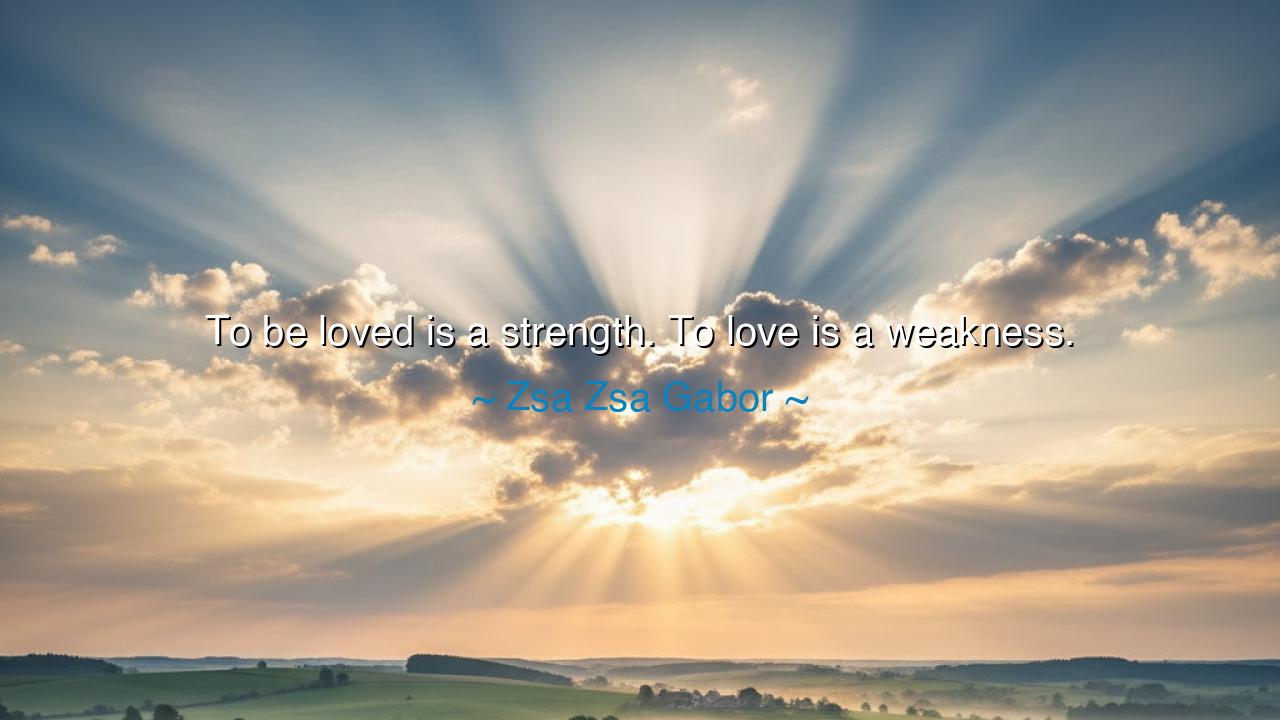
To be loved is a strength. To love is a weakness.






The Hungarian-born actress and socialite Zsa Zsa Gabor once declared: “To be loved is a strength. To love is a weakness.” These words, sharp and paradoxical, echo like the riddles of the ancients, spoken not as idle vanity but as a reflection of the eternal struggle between desire, power, and vulnerability. They remind us that in the realm of the heart, the scales of fortune may tip swiftly, and what seems noble can also bring ruin.
To be loved is to receive the loyalty, admiration, and devotion of others. It is a cloak of power, for when others hold affection toward you, they grant you favor, protection, and influence. To stand in the light of being loved is to be fortified by unseen hands; one feels lifted, invincible, as though destiny itself has chosen to place a crown upon one’s head. This is the strength Zsa Zsa alludes to — the strength that comes when others pour their energy into your being, filling your life with abundance.
Yet to love — ah, that is to step into a tempest! To love is to open the gates of one’s soul, to render oneself exposed, unguarded, and vulnerable. Love demands surrender, and in surrender, one’s heart is at the mercy of another. Here lies the weakness Zsa Zsa warns of: for when you love, you risk betrayal, loss, or scorn. The one who loves deeply often bows before the will of the beloved, and in this bowing, strength may crumble.
Consider the fate of Mark Antony and Cleopatra. Antony, once a great Roman general, mighty among legions, found himself undone by love for the Egyptian queen. In her embrace, he discovered rapture but also ruin. His weakness for her charms pulled him away from Rome, from empire, from his own honor. Cleopatra loved as well, but in Antony’s devotion, she possessed strength — power enough to sway him from war councils to chambers of passion. Their story is the living echo of Zsa Zsa’s words: one was made strong by being loved, the other broken by the act of loving too much.
But let us not mistake this teaching as a command to harden our hearts. Love is weakness, yes, but it is also the very weakness that makes us human. Without it, life becomes an iron cage, secure but barren. The wisdom lies not in refusing to love, but in recognizing that when you do, you give away a piece of your armor. One must tread with awareness, lest the gift of love become the chain of bondage.
From these words, the lesson is clear: cherish the strength of being loved, but wield caution in the weakness of loving. Do not cast your heart like a coin into every fountain, nor kneel blindly at the altar of another’s smile. Guard your affections until they are worthy to be entrusted, and even then, love with dignity, not desperation.
Practical wisdom arises here: cultivate such a life that others will love you — through kindness, mastery of your craft, and the courage to live authentically. At the same time, when you choose to love, remain mindful. Set boundaries like walls of a noble city, so your heart does not collapse under siege. Be generous, but not reckless. Be tender, but not enslaved.
Thus, in the end, Zsa Zsa’s paradox is no mere cynicism. It is a torch passed down from the fires of experience: to be loved is strength, to love is weakness. But the true sage learns to balance both — to bask in the strength of others’ devotion while guarding the tender weakness of one’s own heart with wisdom. For in this balance lies not ruin, but the enduring art of living well.






AAdministratorAdministrator
Welcome, honored guests. Please leave a comment, we will respond soon